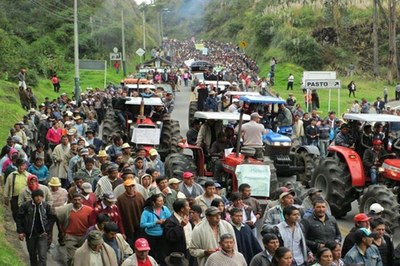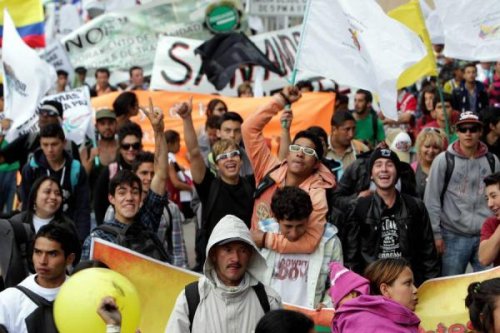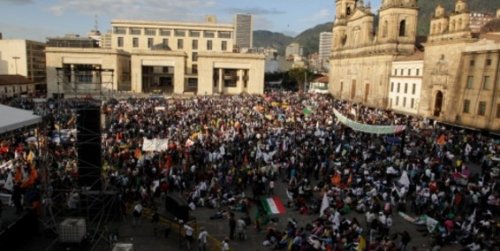
PanAm Post | March 19, 2014 (original en Español)
Colombia: Farmers protest alleged violation of agriculture agreement
Industry alliance calls for greater protection in the face of free trade
By Marcela Estrada
On Monday, representatives of indigenous communities, Afro-Colombians, and campesinos held demonstrations in Plaza Bolívar, Bogotá, to demand a new agriculture policy seeking solutions to the problem of land access and greater protection from free trade agreements.
The movement was launched following the conclusion of the “Cumbre Agraria Campesina, Étnica y Popular” (Agrarian Summit of the Campesino, the Ethnic, and the Masses), which hosted 11 organizations, including the National Agrarian Coordination (CNA), the Black Community Movement (PCN), the Congress of the People, the Patriot March, the Roundtable of Dialogue and Agreement (MIA), and the National Indigenous Organization of Colombia.
The agrarian summit, which began last Saturday, considered eight central issues and compiled a list of grievances citing the Santos government in violation of the Great National Agrarian Pact, which ended the agricultural strikes that took place in August and September of last year.
President Santos has taken a very different position, arguing that 70 out of the 183 commitments made have already been fulfilled.
The list of demands from the campesinos includes agricultural reform, calls for better access to land, reserve zones, the self-determination of Afro-Colombians and indigenous people, restrictions on mining and oil-drilling, and protection for producers faced with free trade treaties.
This last point has been the focus of agricultural groups, who demand the government reverse the free trade agreements, arguing that they have only led to more impoverishment.
As part of the agreements reached after the 2013 strike, the executive promised to provide the agricultural sector access to credit and enact safeguards for agricultural products from countries that Colombia has entered into trade agreements with in the Pacific Alliance and Andean Community.
However, César Geréz, member of the National Association of Rural Reserves, states that “the agreements signed so far are very one-sided, and in most cases have not even come close to the agreements [signed last August].”
The Santos administration has also launched a new program to aid the Agrarian Pact and Rural Task Force through a committee of experts who will make recommendations for agriculture reform in Colombia. According to Minister of Agriculture and Rural Development Darío Lizarralde, “the Agrarian Pact represents measures that we are taking to advance the agricultural progress of the country, farmers associations and unions, requesting guidelines and clarity on new policies.” In addition, the Rural Task Force will be the body responsible for structuring public policy guidelines in transforming the Colombian countryside.

However, the agricultural sector does not appear to see it this same way. Geréz explained that the protests are “a response to the national government’s Agrarian Pact that has sought to deceive the rural sectors of Colombia, and it is an organized response to the failure of the government in different areas of discourse throughout the country.”
Meanwhile, a spokesman for the National Association of Farming Reserve Zones (ANZRC), César Jerez, warned that “if the government does not comply with the agreement,” unions will be “obliged to launch a second national agriculture strike.” To this end, the government would have one month to meet their demands.
However, Minister Lizarralde dismissed these claims, arguing that there were “political motives” behind the agrarian protests. The minister explained that while long term commitments are still in progress, many of the short-term goals have been met. He has stressed that this latest movement is taking place around election time in Colombia, nearly a month from the first round of presidential elections. Should the agricultural strike go forward, it would take place right in the middle of the elections.
Lizarralde believes that the unrest within the agriculture unions is likely due to a “change” in the agenda of the Department of Agriculture. “We are putting forward a dynamic agenda, a progressive agenda, and not only with a short term vision, but also one that allows us to face trade agreements and alliances that have been created,” said the official.

The Economic Background of Agrarian Protests
The protest took place a week after President Santos met with representatives of the agricultural sector, and agreed to enact measures that would favor the development of this economic activity. For example, they reached agreements to enable the regulation of prices for agricultural imports, and the issuance of credit cards with special benefits and other associated credit for producers. So, why then has the agricultural industry continued to protest?
Ivan Carrino, an economic analyst for the Liberty and Progress policy institute, explains that “In Colombia, rural producers complain that the exchange rate is not competitive. What has happened is that Colombia is an economy that is open to the world and has inspired international confidence … combined with the ultra-flexible policies from the central bank, generated a large influx of dollars into the country. This lowered the exchange rate [a weakened dollar relative to the Colombian peso], which impacts exporters, because now their products are more expensive in the international market. That obviously affects them.”
According Carrino, a good solution for the Colombian government may be to further deregulate the industry. “This type of change, we observe, can potentially hassle producers, but it can also benefit them. They can now mechanize production and purchase imports, fertilizers, tractors, among other things. If you add to that the free trade agreements, then even more, because you don’t just open up the border to buy, but also to sell.”
However, Carrino stresses the importance of low taxes on the agricultural industry for this to succeed. The expert argues, “lower taxes means lower expenses, so you can place your product to the world at competitive prices. If you open your borders, but kill your economy with taxes, then you will destroy your economy’s producers. That’s why it’s important that the process of opening up to trade is comprehensive and consistent.”
Translated by Guillermo Jimenez.
Based in Venezuela, Marcela Estrada is a translator, reporter, and copy editor for the PanAm Post. She has a Bachelor of Arts in political science with a focus in international affairs. Follow her at @marcestrada.